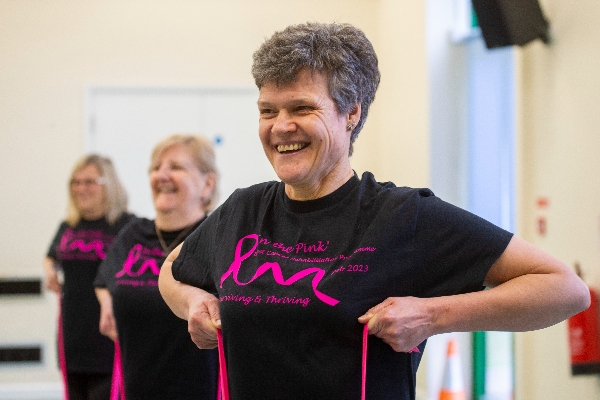
Contact us
Knowing where to start is the first step. Get in touch and let us help take your next step on the road of recovery.
Cancer Active Recovery Support (C.A.R.S.) views complaints as an opportunity to learn and improve for the future, as well as a chance to put things right for the person [or organisation] that has made the complaint.
Our policy is:
A complaint is any expression of dissatisfaction, whether justified or not, about any aspect of C.A.R.S. – encompassing both our fund raising and work.
Complaints may come from any individual, volunteer or organisation who has a legitimate interest in C.A.R.S. including the general public if something is perceived to be improper. A complaint can be received verbally, by phone, by email or in writing. This policy does not cover complaints from staff, who should refer to C.A.R.S. internal policy on such matters.
All complaint information will be handled sensitively, telling only those who need to know and following any relevant data protection requirements.
Overall responsibility for this policy and its implementation lies with the board of trustees of C.A.R.S.
This policy is reviewed regularly and updated as required.
Last Updated date: 23.12.2023
Written complaints may be sent to C.A.R.S. at Lavender House, 21 Pickerings Avenue, Measham, Swadlincote, Derbyshire, DE12 7SB or by e-mail at governance@recoverysupport.org.uk
Verbal complaints may be made by phone to +44 (0) 300 356 1440 or in person to any of C.A.R.S. trustees at the same address as above or at any of our events.
Complaints may arrive through channels publicised for that purpose or through any other contact details or opportunities the complainant may have, such as social media.
Complaints received by telephone or in person need to be recorded.
The person who receives a phone or in person complaint should:
Stage One;
In many cases, a complaint is best resolved by the person responsible for the issue being complained about. If the complaint has been received by that person, they may be able to resolve it swiftly and should do so if possible and appropriate. Whether or not the complaint has been resolved, the complaint information should be passed to the C.A.R.S. Chairperson within five business days.
On receiving the complaint, the Chairperson records the complaint. If it has not already been resolved, they delegate an appropriate person to investigate it and to take appropriate action. If the complaint relates to a specific person, they should be informed and given a fair opportunity to respond.
Complaints should be acknowledged by the person handling the complaint within five working days. The acknowledgement should say who is dealing with the complaint and when the person complaining can expect a reply. A copy of this complaint’s procedure should be attached. Ideally complainants should receive a definitive reply within a month. If this is not possible because for example, an investigation has not been fully completed, a progress report should be sent with an indication of when a full reply will be given.
Whether the complaint is justified or not, the reply to the complainant should describe the action taken to investigate the complaint, the conclusions from the investigation, and any action taken as a result of the complaint.
Stage Two;
If the complainant feels that the problem has not been satisfactorily resolved at Stage One, they can request that the complaint is reviewed at Board level.
At this stage, the complaint will be passed to the Board of Trustees. The request for Board level review should be acknowledged within five working days of receiving it. The acknowledgement should say who will deal with the case and when the complainant can expect a reply.
The Board of Trustees may investigate the facts of the case themselves or delegate a suitably senior person to do so. This may involve reviewing the paperwork of the case and speaking with the person who dealt with the complaint at Stage One. The person who dealt with the original complaint at Stage One should be kept informed of what is happening.
If the complaint relates to a specific person, they should be informed and given a further opportunity to respond. Ideally complainants should receive a definitive reply within a month. If this is not possible because for example, an investigation has not been fully completed, a progress report should be sent with an indication of when a full reply will be given. Whether the complaint is upheld or not, the reply to the complainant should describe the action taken to investigate the complaint, the conclusions from the investigation, and any action taken as a result of the complaint.
The decision taken at this stage is final, unless the Board decides it is appropriate to seek external assistance with resolution.
External Stage;
As C.A.R.S. is a registered charity, the complainant can complain to the Charity Regulator(s) at any stage.
The Board may vary the procedure for good reason. This may be necessary to avoid a conflict of interest, for example, a complaint about a Chair or trustee should not also have the Chair and/or trustee involved as a person leading a Stage Two review.
Complaints are reviewed annually to identify any trends which may indicate a need to take further action.

Knowing where to start is the first step. Get in touch and let us help take your next step on the road of recovery.

There are lots of ways you can help us to deliver our services to those who need them most.

Learn more about In the Pink and lets answer some of your questions.
Cancer Active Recovery Support
Lavender House, 21 Pickering’s Avenue
Derbyshire. DE12 7SB
0300 365 1440
info@recoverysupport.org.uk
Registered Charity Number: 1201440
